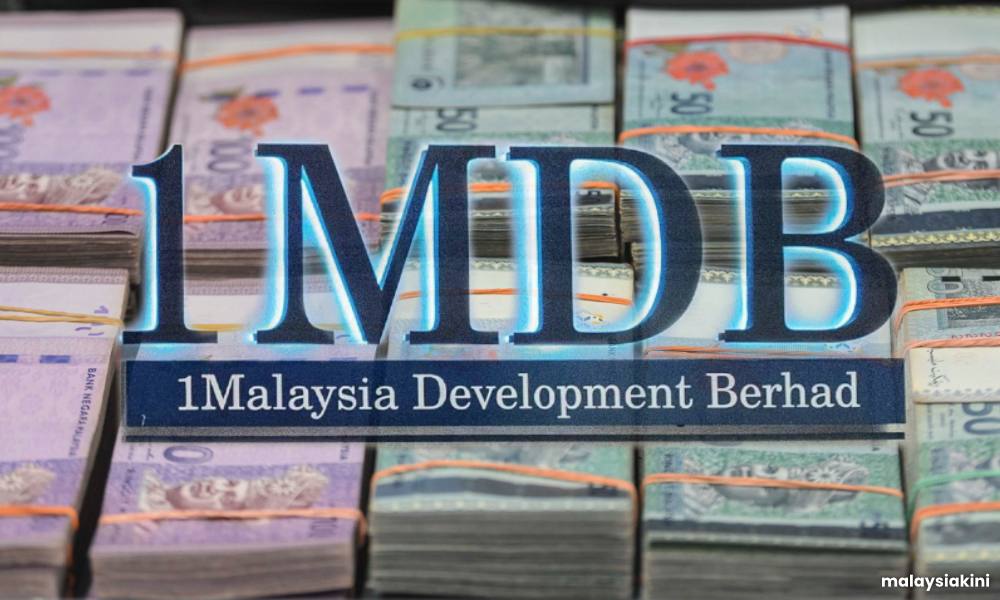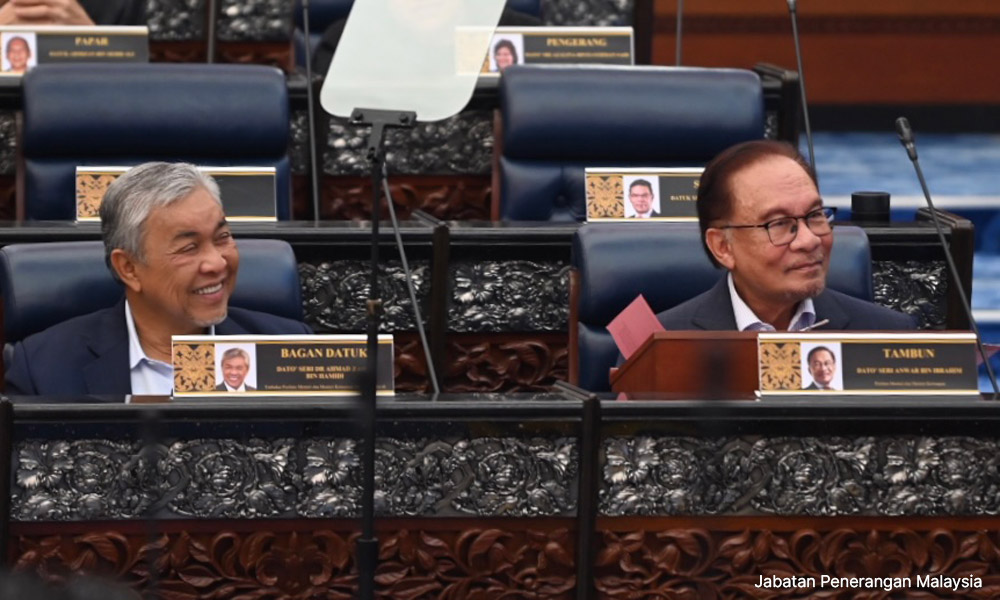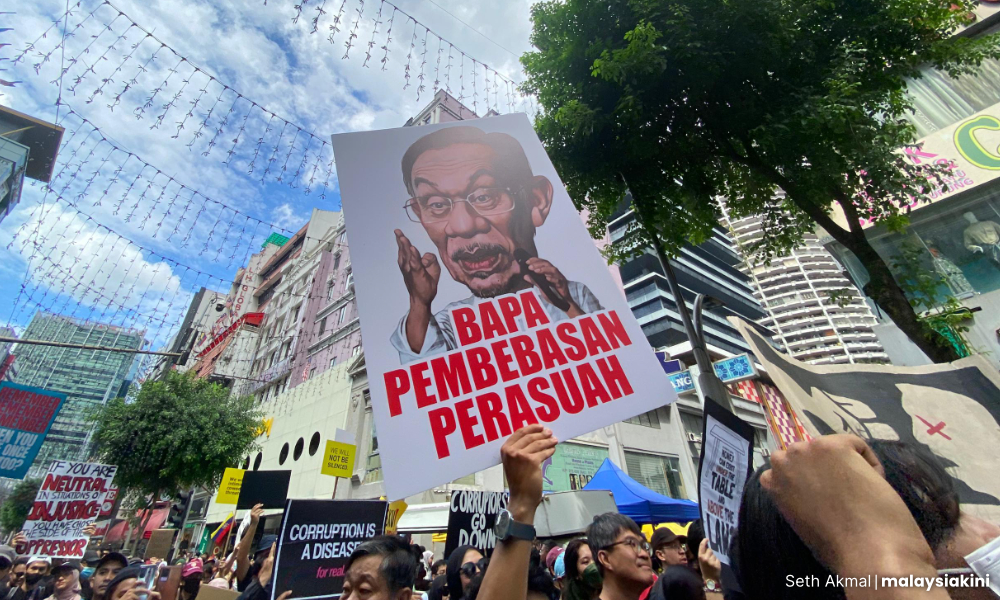Amidst conversations regarding the possibility that former prime minister and convict Najib Abdul Razak may be granted house arrest for the rest of his sentence, the Center to Combat Corruption and Cronyism (C4 Center) expresses absolute condemnation against this unwarranted leniency.
We join the chorus of civil society organisations, think tanks, and concerned Malaysians who are outraged at Prime Minister Anwar Ibrahim's government's apparent lack of commitment towards anti-corruption.
Why has the tone of the Madani government been so sympathetic to Najib? Have they forgotten the sheer scale of his crimes?
Najib was convicted for abuse of position for gratification of RM42 million, three counts of criminal breach of trust, and three counts of money laundering which led to a sentence of 12 years’ imprisonment and a fine of RM210 million.
On Jan 29, 2024, Najib received a commutation of his sentence for his conviction in the SRC International trial through a royal pardon. The pardon commuted the sentence to only six years’ imprisonment and a mere RM50 million fine.

Najib remains on trial for corruption-related offences in three separate other cases - the International Petroleum Investment Company, 1MDB, and AmPrivate Banking money laundering cases.
Since then, speculation has swirled around a purported addendum to the main pardon document, which states that Najib is allowed to serve the rest of his sentence under house arrest. Following reports of the addendum, the government proposed a law enabling house arrest for certain offences.
In an interview with the Financial Times, Anwar also defended the reduced prison time for Najib, stating that he himself went through the “hell” of prison time and solitary confinement, ostensibly implying that he does not wish the same for Najib.
There should be no sympathy for crimes of Najib’s scale, let alone from the prime minister.
Lack of reform
Worryingly, aside from Najib, Anwar’s administration also seems to have developed sympathies for other individuals embroiled in corruption cases.
Instead of supporting public calls for accountability from the Attorney-General’s Chambers (AGC) for the various acquittals and discharges not amounting to acquittal for scandal-ridden politicians, the government has not only remained silent but also welcomed individuals such as Ahmad Zahid Hamidi and Musa Aman back into the highest levels of government.
Major institutional shortcomings remain unaddressed, most pertinently the lack of independence of the AGC and the MACC from executive influence. This lack of reform - despite public indignation - strongly points toward the mishandling of corruption cases involving politicians as being far from incidental.

It is no stretch of the imagination to find that the dropping of charges benefits key figures in the BN coalition, of which the Madani government is formed together with the Pakatan Harapan coalition - Zahid remains the Umno leader while Najib and his wife Rosmah Mansor are still well-loved figures in Umno.
The political expediency of it all is not lost on Malaysians - the government has also been widely criticised for its mishandling of the ongoing Sabah state government corruption saga which finds its key alleged perpetrators in politicians aligned with Gabungan Rakyat Sabah, another component political party part of the current government.
Malaysians are fed up with political games
Let us be perfectly clear: there is no longer “growing” discontent among Malaysians at the government’s anti-corruption efforts. Malaysians are dissatisfied, angry, and demanding change.
On Jan 25, hundreds of Malaysians turned up to a rally organised by the Sekretariat Rakyat Benci Rasuah demanding real change from the Madani government. The rally was primarily student-led and followed another anti-corruption rally in Sabah.
The group made three demands: to separate the AGC from the Prime Minister’s Office; to free the MACC from political interference, and to introduce a Political Financing Act.
Both these rallies were marked by their heavy police presence, discouragement of attendance by public educational institutions, and a lack of support by politicians who - prior to attaining power - had once taken to the streets to demand reform, such as Communications Minister Fahmi Fadzil and Anwar himself.
When Najib was first arrested, charged, and sentenced, Malaysians rejoiced. These events signified a step closer towards reforming the political structures built upon corruption and money politics that have weakened the nation for decades.
The granting of a house arrest to Najib, the man responsible for one of, if not the worst corruption scandals in Malaysian history, could be the death blow to hopes of good governance, transparency, and faith in the system for millions of citizens.

While it is true that Anwar may not have full control over this potential scenario, his sympathetic stance to Najib’s plight completely undermines his anti-corruption promises.
The country needs stronger leadership against corruption and the politicians who have devastated this nation.
We have had enough of empty words and promises - there can be no house arrest for Najib. - Mkini
The views expressed here are those of the author/contributor and do not necessarily represent the views of MMKtT.




No comments:
Post a Comment
Note: Only a member of this blog may post a comment.